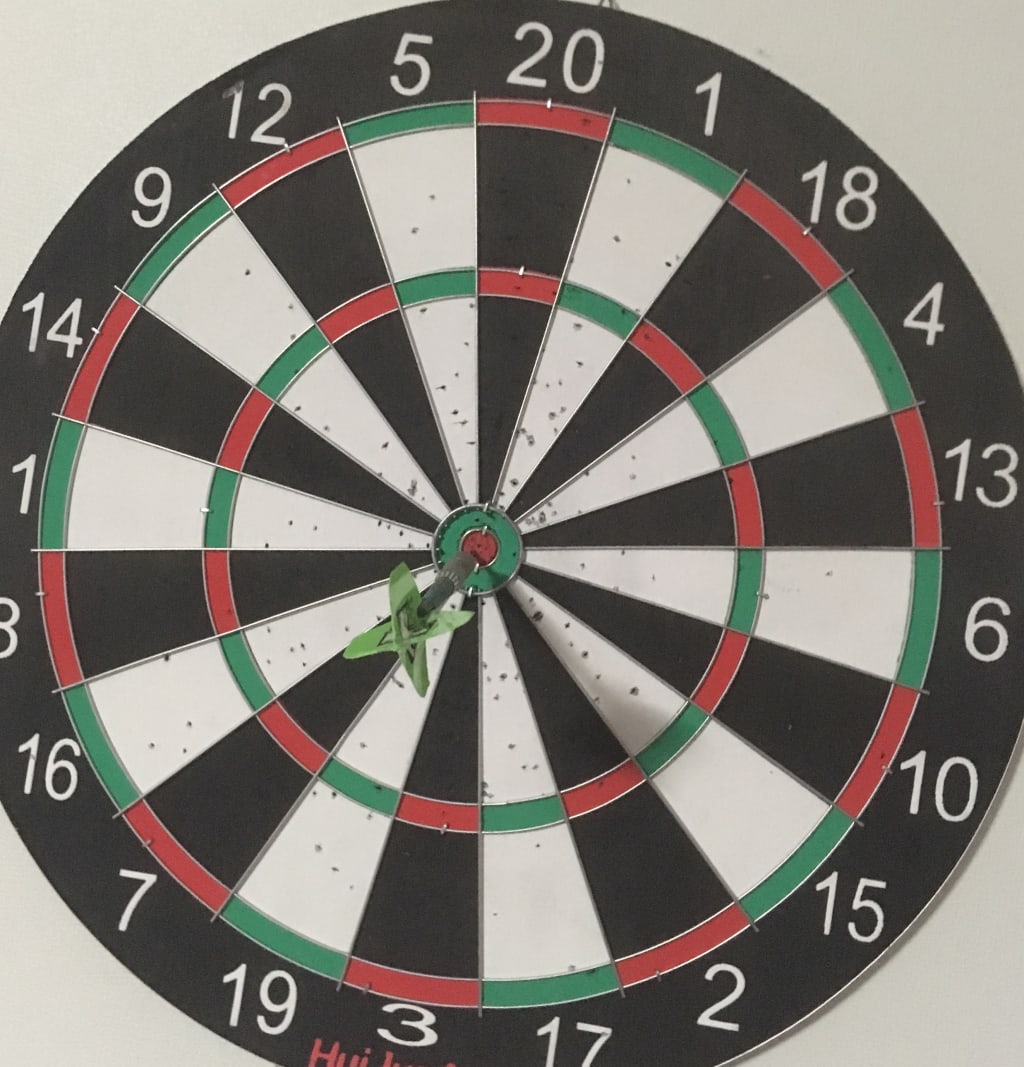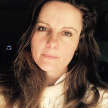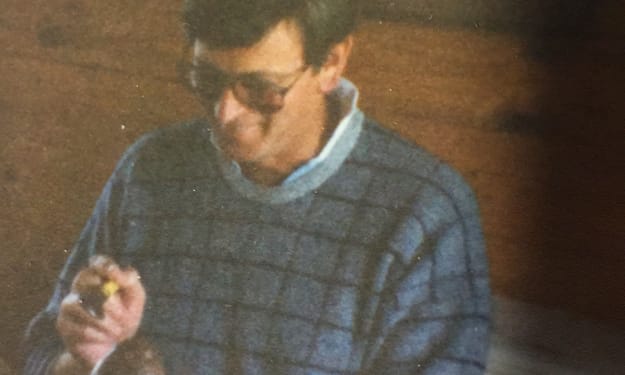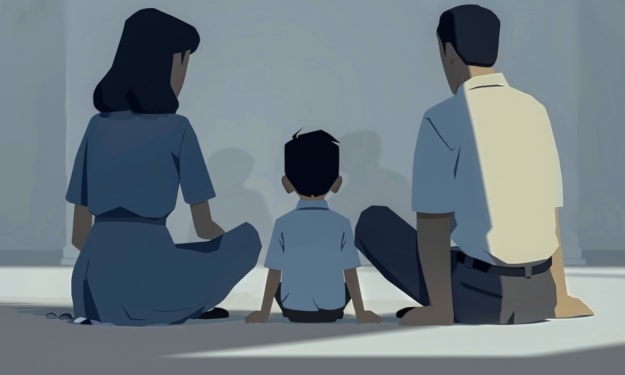Bullseye
Church life in Cambridge

My name is Jacintha Fleming. I'm named after a rare butterfly that lands on Brooke Sheilds' hand in the movie; The Blue Lagoon, by Henry De Vere Sackpoole. The Great Eggfly; also known as Jacintha Eggfly, Hypolimnas bolina, or the Blue Moon butterfly in New Zealand, is my ascendancy. I am in my sixteenth year as a fifteen-year-old girl. I love my family. I have bewitching jet black hair that shines in the sun, and am green-eyed like the sea on a stormy day. I inherited the gift of an infectious grin from my father, which is a lucky charm. We wear our gift every Sunday, when we go to the local Catholic Church. My parents promote a strict catholic environment within our family home, marking religion as a way of life for me. The previous generations have placed paramount importance on getting to know their church community, and on bible studies.
On Sundays, after mass, I stay for the morning tea. Thus, I consider this location to be a second home for me. After the Cathedral service, I like to watch the parishioners leave the church, usually from the bay window in the church library, sometimes from the adjacent doorway window. I sit and listen as they head to their cars. I hear the sharp crunching sound of their shoes on the loose gravel surface, the closing of vehicle doors, and the monotonous hum of car engines. Noticeably, the people move at a leisurely pace, stopping and talking in groups before moving onwards to their homeward destinations. There is a bus load of devout families. I hear their laughter as they climb onto the free bus service, eager to get home. Our church is a good thirty minutes from the city; most devotees drive or take the provided free bus.
Today, the carpark is full to capacity. So the warden stands at the gateway, directing the congested traffic down the hillside. On the left-hand side of the carpark are the walking tracks. The church encourages walking, especially if you are young and able. There is a rightous path with six hundred steps to climb, and a steep gravel road to follow up the hillside; both are accessable. I have attempted this exertion - climbing the six hundred stairs was hard work because of the incline. Wearing a coat is sensible, as the weather is unpredictable, and a good pair of walking shoes is recommended. Paths are groomed and gardeners follow strict best-practice planning guidelines, allowing walkers to admire their workmanship. These efforts incorporate flowering tropical plants; and small trees beside the paths to create shade in the warmer months, soft woodchip footpaths benefiting the walker, and recently constructed outdoor seating enables repose during the walk. Abundant wild native flowers grow naturally, adorning the glade areas along the walking track beautifying the surroundings. The Pilgrims' way is pragmatic, and is featured in our weekly ministry newspaper headed: 'The Walk of life. My mother recommends going on a pilgrimage, advising it to be a wonderful idea for health, and that it supports a holistic view of the Catholic Church, while my father considers it idealistic. The churchyard is shrouded in mystery, and they say the land is steeped in magic.
During the eighteenth century, witches ruled the mountainside, leaving behind twelve large boulders in the shape of obelisks. They are placed around the perimeter of the circled carpark. Inside is a pentagram made of gold. Small coloured riverbed stones, quite spectacular, adorn the ground. These stones are quarts; ruby, agate, and red granite laid in a continuing series, forming a large and small pentagon. The bullseye, and the five acute and five obtuse isosceles triangles are made of fool's gold, and are around the outside of and inside the pentagons. The large pentagon is clearly visible from where I am sitting, with the inscription around the outside reading: Take the lord twelve stones from the very place where the holy men stand. I'm not sure what it really means, and do I care! In the eighteenth century, a coven of thirteen members, including a high warlock wizard, was said to have worked their magic inside the pentagon. Historically, this magic was performed every All Hallow's Eve, or solstice, depending on the seasonal celebration. However strange it may seem, I consider this legend a bona fide tale and one to view with some trepidation.
I am sitting in the library, the room the church uses for holding Sunday morning tea; watching Father Andrew who is standing at the holy doorway smiling, as he shakes hands with the preceding morning congregation. The last of the assembly are exiting the church. They walk towards the carpark. Turning around, I am within the library area, which is occupied by Betty Smith, who organises the morning gathering. She is readying the tables with four helpers: Jane Fleming, Alisha Reid, Sarah Reid, and me. We are adept at making tea and coffee and looking after the guests. My dad tells me that Betty Smith is a lovely woman, considered an honourable wife and dedicated to the church community, a good example for me. The helpers are; my sister Jane who is in her twenties, she is mature and well-spoken, with beautiful sea-green eyes and jet black hair. Coming to church independently, Jane kneels at the altar and prays an entire rosary. I have watched her while I learned to pray, and read my rosary beads, but I do not understand what it means to implore. With considerable effort, I will learn. Together we help the church community group, along with Alisha and Sarah Reid, who serve tea and cake on the tables and look after the children. Their mother is Spanish and they are dark-haired, she speaks words only they can obey. I cannot understand why she kisses the cross around her neck in church and leaves her girls to work in the church library, but never comes to morning tea herself. Today, we expect one hundred church-goers to attend the morning tea. The get-together is arranged by the church to help foster a sense of community within our religion. This spirit helps unite all members of the church community.
"Here, have a glass of orange juice," says Jane to the children that have gathered at the main table. They reach up slowly, clumsily taking plastic cups full of orange juice that Jane is pouring. Quietly they sip their drinks. Being lucky children, they are received warmly by the church. Jane is an excellent role model for the children, behaving very calmly, and she is polite when spoken to. Mathew, the mountain shepherd, places bags of apples and pears on the main table. Each bag is opened, the fruit polished, then decisively positioned inside the fruit bowl by Sarah, while Jane helps with the crying children taking them outside and consoling them, so their mothers can have a cup of tea, and relax with the church community. Sometimes I help too! Jean Brown marches slowly over to the main table, followed by her fourth husband.
"Freshly squeezed navel orange juice made with home-grown oranges from our garden," says Fred Brown.
"Picked by me," says Jean Brown enthusiastically.
Jean Brown is the local primary school teacher. She has a personality disorder, consequently, she's been divorced three times and is now married to Fred Brown. She is quite helpful, especially with children. I watch as Jean Brown lifts Timmy's cup filled with orange juice. Jean Brown is a 'do-gooder.' A divorcee, in the past she helped, pregnant women in the community by purposely setting up a small women's shelter in her home. Thus, helping the incontrovertable manifestation of life come into existence.
"Thank you," says Timmy to Jean Brown.
"That's alright Timmy, you can join the other children," says Jean Brown. abruptly ushering Timmy towards the group on the floor. Jean Brown moves quickly to stand beside her husband, Fred Brown, who is on the church board of trustees. A good-looking chap, with Mediterranean influence, his dark complexion contrasts with Jean Brown's creamy pale skin. He joyfully takes Jean Brown's hand, smiling.
On Sunday morning Saint Mary's church is full and the devout assemble to hear Father Charlie's sermon. It is a place without bias, or at least the narrow-minded intolerances are hidden. Tourists are allegedly encouraged to visit the site. Marked as a tourist site on the map, and noted in the travel guide as a great introduction to our city--Cambridge. Tourists are encouraged to join in the congregation. The church loves all people and all who enter the sanctuary are welcomed. Children are expecially accepted they gather at the main table, and wait, while Jane cuts segmented pieces of apple and pear into small slices. Having succeeded in receiving the fruit the children stand quietly eating. I love children and help them when I work voluntarily. One day, I am going to be a primary school teacher.
"You are doing a wonderful job," Jean Brown says to Jane.
Alisha walks over to the main table and leads the youngsters away to the children's section. The area is arranged with cushions, placed in a small oval shape. Alisha offers each child a cushioned seat. The cushions are hand-embroidered by the woman in the embroidery group. Each pillow is adorned with bibilical scenes with Latin words around the outside of every cushion; words like Pax vobiscum, Caritas christi, and Semper invivtus. I don't understand Latin--the classical language, an antiquated dialect, but I accept it as part of my catholicism.
"It is time for a story," Alisha says. "It is called The Black And White Rabbits Wedding, by Garath Williams. Because it is my favourite I will read it to you. Now nestle down quietly, please children!"
The fifteen children sit at Alisha feet. She opens the book slowly and reads.
"In the cool forest lived two little rabbits, one black and one white. Together they loved playing games; finding the daisies, hiding the acorn, and jumping the toadstool, while eating a lot of yellow dandelions every day."
Sam Clark is standing at the tea, coffee, and cake table. She is in intense conversation with Mavis Daily, Jenny Webblies, and Edward Puller. Unescorted Mary Poulter arrives with her three children around her ankles, they look up timidly as they pull on their mother's skirt. Mary picks up the youngest child, who is crying. Beautiful Mary, with red hair that cascades down her back, hugs her youngest child. I watch as the small child clings tightly to Mary's shoulder, her tears subsiding. Assuming her mother's beautiful red hair was a lucky inheritance for the toddler. Unassumingly, the child hides her face shyly in her mother's chest; in the toddler's grasp is a rusk. The two older preschoolers have platinum blonde hair and are hiding behind Mary's skirt. Jane Fleming walks over to the table and picks up two plastic cups and a Tommee Tippee, which she then offers to Mary Poulter's three children. Next, Jane organises a cup of tea, with a small biscuit on the side of the plate for Mary Poulter.
"Mathew, could you please bring Mary a chair," orders Jane Fleming. Speaking quietly to Mathew, the mountain shepherd. Jane is attractive as well as being commanding, enigmatic, and sensual. These are traits that not all women possess. Mathew obliges by exploring the room for one large and two small chairs for the Poulter family. I turn slowly around, to look out the bay window. The collected guests' cars are parked. A gentle breeze is blowing, playing with the autumn leaves, the gust twirls leaves around in whirling pirouettes, influencing my perception. I summarise, it is as if the leaves were dancing. A lone cat is paused by the entrance to the car park, it looks upwards then darts into the nearby bush, and far away under the liden trees, I can see a doe retrieving her fawn. Father Charlie has left his station by the holy doors and now stands amidst the small gathering. Sarah is waiting on him bringing him tea and cake. I watch the primary groups; the Clark's, Daily's, Webblies, and Poulters, who each own local retail outlets in the city. The Clark's make home furniture; the Daily's; shoes, the Webblies; a biscuit factory; and the Poulters own a supermarket, the only one in Cambridge. All three successful entrepreneurs form a solid coalescence that fuses them until death. I listened to their conversation hoping to pick up on their success.
"Do you know what The Rabbits Wedding is about?" Sam Clark asks Mavis Daily, Jenny Webblies and Edward Puller.
"No," says Edwards Puller.
Mary Poulter sits down with her three small children. Mary accepts the food, and a cup of hot tea from Jane. Jane also offers to help with Mary's children if needed. Sam Clark waits.
"No, but thank you," Mary sighs. "It has been a long morning."
Jane smiles at Mary and then turns to thank Mathew, the mountain shephard.
"Thanks Mathew," Jane says, touching his arm. "You're appreciated."
"No problem," answers Mathew, the mountain shepherd.
I exhaled, wishing I looked like Jane when she smiled. Her face illuminates the room. The room is now full with the expected quota of people; Jean Brown is talking and interrupting Sam Clark.
"It is nice to see young people helping," says Jean Brown. "It gives them a sense of independence."
"Sorry Sam, I perceived it to be anthropomorphism," answers Mavis Daily patiently.
"It is about acceptance of different cultures," says Sam Clark briskly.
"Why on earth would we need to have an acceptance of that?" whispers Mavis Daily. Mavis is full of suspicion and religious bigotry. Not wanting to offend anyone, she whispers, "I think it's just a silly story about rabbits getting married."
"Which is just ridiculous," says Mary Poulter. "My poor children, rabbits, don't get married, what will they tell them next?" she sighs.
"A brilliant story, using colour and animals as a way of accepting different cultural worldviews," says Duncan Evanson.
"We are happy the way we are in our own race," Mavis Daily says.
"That is happening now," sighs Jane. "The government has bombarded our city with foreigners. New developments with high rise complexes and homes are being built. The wild animals are scared off the farmland, by the loud machinery and new buildings being erected."
"I think it is progress," says Alisha. "The black and white Rabbit's Wedding is an analogly, for a black man marrying a white woman or vice versa."
"The rabbits breed very quickly," says Jenny Webblie.
"They dig holes and destroy our farm land," says Edward Puller.
"The rabbits need to be eradicated before the machines start working," says David Ruler.
"It is Watership Down recreated," says Sarah. "We need a wildlife sanctuary for the animals."
"Yes Sarah, you're right!" agrees Betty Smith. "That is unfortunately hard to organise, as a lot of the wildlife hide in burrows and swampland until the machines dig."
"They escape," says Besty Gravvers.
"Its a beautiful story," resonds Jane. "Marriage is important. It is about love and unity."
"It should be called acceptance!" responds Edward Puller quietly.
"I think my children need a story," utters Mary Poulter, standing up and ushering her two preschool children into Alisha's group on the floor. She walks back, sitting down with her toddler in her arms, to finish her cup of tea and biscuit. Mary Daily turns to talk to Duncan Evanson a fundraiser for the Red Cross. He has a slight lisp and is very concerned with charity work; by helping the less fortunate he has built his reputation. His father set up The Foundation For The Blind, with a live-in on campus learning centre which teaches braille, and an off-site dog training centre just a few blocks away. Duncan Evanson has maintained his family status, sustained by the charities which he helped fund. A well respected man, he lives alone coming to church every Sunday and enjoying the morning tea.
"Well that crossed a few boundaries," whispers Sarah to Betty Smith. "Political integration of different races. We are a great big melting pot of love," laughs Sarah.
"Aaaaas faaar as I can ttttelll itts aaabbbout Mmmmarrriage," lisps Duncan Evanson.
Mavis nods.
Jane frowns.
"We are in church," Jane says to Sarah. "A sacred house of God, where God accepts all denominations."
"And all donation---," says Denise Weber, smiling foolishly at Melissa. Denise is a lesbian and a goth. She is dressed in black and wears a large cross around her neck. A hypocrite of the faith and very opinionated, Denise ran away from home to live with her lesbian lover in the city of Cambridge. In Cambridge she set up a piano shop selling the most expensive pianos (Steinways), and teaching music. Her lover melissa works as a community Nurse at the local hospital. The tolerance of the church allows such behaviour and no judgement is passed. Being clever the two women have secured themselves in the comunity, as a piano teacher and a Nurse.
Jane Frowned
"The Church gives free cups of tea and cake," says Jane, diverting the subject.
Furthermore, donations are optional and up to the discretion of the individual," says Betty Smith.
"We accept charity to help with up keep and for the use of the church facilities," says Jean Brown.
Jamie Phillips helps Penelope Davis, who is in her eighties across the room to the table for the elderly. They gather around in small groups talking, and drinking tea. Most have lived in Cambridge all their lives. They help keep the peace, by being well mannered and prudent. The elegant group judges the behaviour of the children, while quietly watching the gathered people in the room.
"It is acceptable to give donations to the church," says Edward Puller.
"The collection is part of the appeal, so we can attend Church services," remarks Marice Puller. Marice Puller's son is Edward Puller, a biologist like his father he studies science, not religion. Nevertheless, Marice and Edward enjoy chuch. Marice Puller was a brillant scientist. He has written four books: The Human Body, Evolution Within The Human Species, Black Holes In Space, and The Eternal Mind. Being well repected, he can speak as he wishes and does so vehemently.
"Yes---," responds David Ruler, agreeing with Marice Puller. David Ruler had family ties that put him in the council seat as Mayor. Now at eighty-six he has a health condition and a care worker to look after him. Devoted to the church he arrives every Sunday for communion with his health career. A kind man, he has helped raise money for the poor in the city of Cambridge. Betsy Gravvers is David Rulers health career she has wavy brown hair and a dimpled smile. The daughter of a Catholic nun and a builder, she is a sweet person who maintains her catholic status. However, religiously she is never on time which annoys the Catholic diocese.
"Be more organised," sighs Betty Smith, looking at Betsy Gravvers
Humphery Pouller sighs, "For the future benefit of peace in the community. We require you to be more organised Betsy, so as to arrive on time for morning service."
Humphery Pouller is a poet and a songwriter. He is named after a sea elephant that swam onto the shore of an east coast beach resort. Civilians respect him because he imposes order, and his poems contain great beauty.
"I am sick of listening to you clambering into the church, half an hour late with David," says Humphery Pouller, addressing Betsy.
Betsy had interrupted the silence again,' I thought. After reviewing the morning service, in which the crowd pulled faces and patient sighs echoed around the church walls. Looking at her now, Betsy has gone crimson and is sweating slightly on her face.
"I apologise," says Betsy. "That I have disturbed you Humphery, it was unintentional."
"It is for everyone in Church Betsy, please be more aware," responds Humphery Pouller.
"I will try to never do it again," sighs Betsy.
"I want to be buried in the church graveyard," groans Elizabeth Jones, sipping her tea. She is a respected member of the elderly group and a worrywart, who suffers from fainting spells.
"It costs money," said Humphery Pouller.
"That was David Ruler's area of expertise," responds Edward Puller.
"David has resigned from the council," says Betsy smiling.
"A cemetery plot, I will talk to you about it on Monday Elizabeth," answers Betty Smith.
Elizabeth nods in response, "Yes, thank you dear."
"Need any help Penelope?" asks Sarah.
Penelope Davis is trying to sit down next to Elizabeth Jones. Jamie Phillips lets go of Penelope Davis, as Sarah takes over helping. Immediately, Jane hurries over with a tray full of tea, coffee, and cake.
"Shot!" says Jamie Phillips to Richard quietly, as Penelope Davis, who is in her eighties, sits down on her chair just missing the floor. Jamie grins at Mark foolishly, showing his perfect white teeth. Mark and Russ grin back and laugh along with Mathew, the mountain shepherd.
"Thank you," Penelope Davis says to Jane, ignoring the men and smiling happily.
Penelope Davis is a pensioner and a widow. She wears her long grey hair, neatly inside a hairnet. She has yellowing teeth from smoking too much tobacco without a filter, and an enormous smile, which allows her much popularity with her friends. Sarah helps Margaret Edwards to the table with the pensioners, a long time friend of Penelope Davis. Margaret Edwards carries her knitting everywhere in her brown leather handbag, pulling it out at opportune moments. In her late seventies, she is younger than Penelope Davis with light silver hair, she holds an air of the lower aristocracy. Displaying affection towards her friends, demonstrating an intimacy that unites people of the same generation. This is inherited, or perhaps at second glance it is attributed to their Saxon origins, which I ascribe to hairnets, knitting and affection. I sigh, as I look at Jamie Phillips. He is the local games warden, a tall skinny man in his early twenties. He smokes at every opportune moment, along with Mark Hamlet, the supervising games walden; Russ Morrison, the games manager; and Mathew Robertson, the mountain shepherd. They protect the native animals; wild game birds, goat, deer and cattle populations on the mountainside. To my astonishment, Betty Smith hands a little book to the group of men: Alan Carr's book, One hundred Easy Ways To Give Up Smoking, with the little blue stamp on the front reading: Saint Mary's Cathedral.
"Thank you Betty," says Mathew, the mountain shepherd.
"It will do you all good to read it and return it," Betty says.
"Freedom from addiction!" laughs Jamie Phillips, shoving Russ Morrison playfully while laughing with Mark Hamlet and Mathew, the mountain shepherd. Jamie has a silly sense of humour and fancies Sarah. Jamie looks longingly at Sarah. So mark nudges Jamie in the ribs.
"I think you had better leave that one alone," says Mark. "She is from the upper crust."
Sarah moves back to the main table, away from Jamie, who she ignores. Annoyance plays across her face; screwing up her features, she grimaces. Once, she told me, she thought he was a fool.
"The only thing we have in common is smoking," says Sarah to Jamie and we're going to die the same way of similar causes. So keep away!"
"And that our father atends the cockfights," says Alisha.
A loud sigh from the group, and then an ooooooooh and then------
"We are in church, the holy place of God, where no killing or persecution of any living thing shall take place," says Mavis Daily.
"Holy ground," says Mathew, the mountain shepherd.
"We close the door to the devil (V.27-30) and open the door to the holy spirits control," says God.
An almightly voice booms around the room. It happens often in our Catholic Church Cathedral, so no one minds the interruption. I stare at the large clerestory windows, of which there are six. These allow the sunlight to penetrate the church; it streams onto the ground. From the large window, I stare at the light on the ground, it's creating colored patterns on the wooden floor boards, from the stained glass bibilical scene. I ponder refraction and beauty. Janet Kingsley breaks my silent stare.
"What a wonderful sermon Father," says Janet Kingsley, an ambitious catholic woman. She has placed herself at the feet of the church, hoping she would gain merit. This would allow her to follow her dreams of reciting readings in church, helping with the wine and bread offerings, and becoming a servant of God. I cough, as I move to stand beside Jane, simultaneously watching Janet Kingsley. Upon observing her every move, I notice her subtle and narcissistic demeanour.
"Liberato," says Janet Kingsley, trying desperately to be meek. Janet Kingsley is very wealthy; she is a farmers wife. She has invested her money in fashion and opened a museum that contains prehistoric fashion and today's twenty first century dress codes. She has created perfumes, jewellery, and makeup under her own label called Janet Kingsley. Her name is the optimistic chatter in cafes, and she only mixes with elite society. Unfortunately, her taste for isolation would be her downfall, interpreted as superiority, leading to her abandonment and loneliness.
"Bravo, Father," says Duncan Stephanson. Duncan is a drunk man. I've regularly seen him wandering the streets with an expensive bottle of port in his hand. Occasionally spotted singing loudly in a drunken stupor, he is often mistaken for a beggar. As result, he pays hefty fines to the cop-shop for loitering, because of his vice of loving to gamble and swill whisky in the clubs and bars on the city streets. Duncan has created a name for himself as a boozer. A bachelor, he prefers prostitutes to real women, using the church as an instrument to quell his guilty behaviour. Duncan has drunk his cup of tea. He stands with the last patrons who are ready to leave the library. The room is slowly emptying. I sigh. Time to pack up the morning tea. The community leaves cake crumbs on the main table, dirty tea, coffee cups, and a small stack of plates. We quietly pack the remains into one big container, and carry it to the kitchen to be cleaned.
As I sit back and reflect on the morning, I notice three white doves flying into the open holy doorway, a peaceful blessing bestowed by God. He has sent his holy angelic messengers, a gift for deliverance. It has been an intense reunion, with debate and discussion. I have learned a lot from the people in the church community, whose differences interest me. Jane comes and stands beside me, as it is time to think about leaving the church.
"Jacintha, you've been very reserved today," says Betty Smith, thanking us for our voluntary service. I smile. The church has consumed me; its people, the passion, all saints and apostles, and the divine worship of the cross. I look around the room hoping to find a friendly face, but all the people look like bland soldiers ready to battle the outside enemies of the church. They steadily move through the library door, and suddenly we are alone as the dust settles ambiguously. Father Charlie has gone to the rectory, and I keep searching for that friend. Then I pause and instantly feel the warmth of something familiar. A smiling face across the room. Then, instantaneously bullseye, it is my mother - Daria, who I run and hug.
About the Creator
Rebecca Jane Edmonds
I enjoy writing and expression. I hope you like, what I have written.
Thank you from,
Rebecca Jane Edmonds.
Enjoyed the story? Support the Creator.
Subscribe for free to receive all their stories in your feed. You could also pledge your support or give them a one-off tip, letting them know you appreciate their work.






Comments (1)
Thank you I hope you enjoy the story... And more is coming...